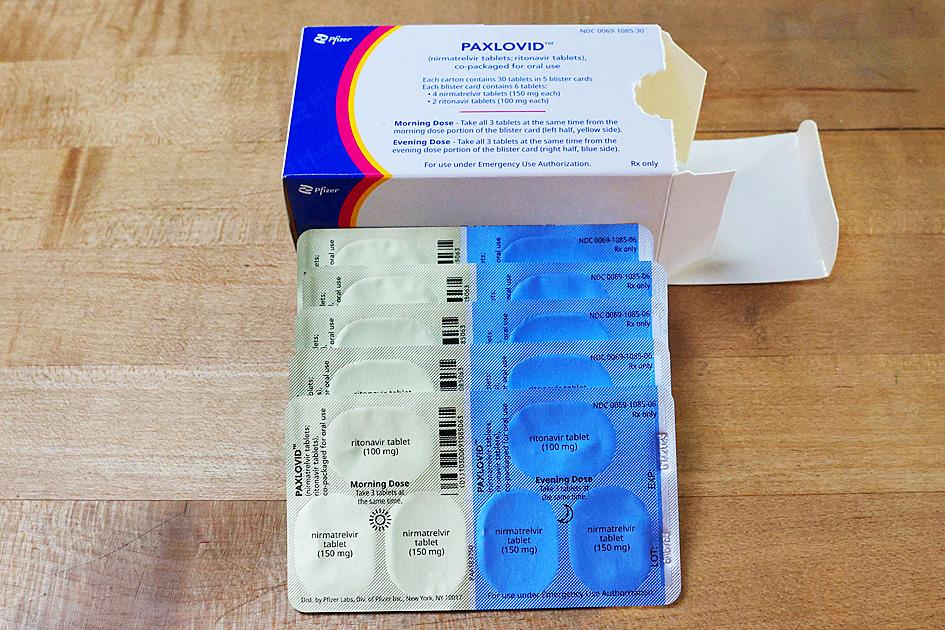The Central Epidemic Command Center (CECC) yesterday revised eligibility criteria for taking Paxlovid, an oral antiviral for treating COVID-19, adding “women who have given birth within six weeks” to the list and removing “current or former smokers,” effective immediately.
A total of 1,053 courses of Paxlovid and 307 of molnupiravir, another oral antiviral for treating COVID-19, were prescribed on Sunday, lower than the numbers prescribed on weekdays, said Minister of Health and Welfare Chen Shih-chung (陳時中), who heads the center.
“I have watched a lot of related news this morning and it seems that many people are still unclear about the use of the antivirals,” he said. “I must re-stress that not all confirmed [COVID-19] cases need to take the antivirals.”

Photo: Reuters
The antivirals are effective in people at higher risk of complications or severe illness and might not have similar effects in people with no such risks, he said.
For people under the age of 65, Paxlovid should be prescribed within five days of the onset of symptoms.
There are four eligibility criteria: being aged 12 or older; weighing at least 40kg; five days having passed since the onset of symptoms and no supplemental oxygen required; having an illness with mild to moderate symptoms; and having at least one of the 12 indicators of being at high risk of developing severe symptoms.
The risk factors include cancer; diabetes; chronic kidney disease; cardiovascular disease (except hypertension); being pregnant or having given birth within six weeks; chronic lung diseases (interstitial lung disease, pulmonary embolism, pulmonary hypertension, bronchiectasis and chronic obstructive pulmonary disease); and tuberculosis.
They also include chronic liver diseases (cirrhosis, nonalcoholic fatty liver disease, alcoholic liver disease, autoimmune hepatitis); disabilities (attention deficit hyperactivity disorder, cerebral palsy, congenital defects, developmental or learning disabilities and spinal injury); mental illness (emotional disturbance and schizophrenia); and dementia.
Adults with a body mass index of at least 30 and adolescents aged 12 to 17 with a body weight in the 95th percentile or more are also considered high-risk.
Other risk factors include diseases and conditions that affect the immune system (HIV/AIDS, congenital immunodeficiency, having had an organ or blood stem cell transplant and using steroids or other immunosuppressants).
“Being a current or former smoker” has been removed from eligibility criteria, Chen said.
As there is not enough clinical data on the effects of Paxlovid on pregnant women or women who have given birth within six weeks, they can take the drug if a doctor assesses that the benefits outweigh the risks, and has clearly informed the patient and received her consent, he added.
Eligibility criteria for molnupiravir are almost the same as those for Paxlovid, the only differences being that the patient must be at least 18 years old and have at least one of the high-risk factors, except pregnancy and being postpartum.
Molnupiravir can only be prescribed when a patient cannot take other suggested drugs.

STATS: Taiwan’s average life expectancy of 80.77 years was lower than that of Japan, Singapore and South Korea, but higher than in China, Malaysia and Indonesia Taiwan’s average life expectancy last year increased to 80.77 years, but was still not back to its pre-COVID-19 pandemic peak of 81.32 years in 2020, the Ministry of the Interior said yesterday. The average life expectancy last year increased the 0.54 years from 2023, the ministry said in a statement. For men and women, the average life expectancy last year was 77.42 years and 84.30 years respectively, up 0.48 years and 0.56 years from the previous year. Taiwan’s average life expectancy peaked at 81.32 years in 2020, as the nation was relatively unaffected by the pandemic that year. The metric

Taiwan High Speed Rail Corp. (THSRC) plans to ease strained capacity during peak hours by introducing new fare rules restricting passengers traveling without reserved seats in 2026, company Chairman Shih Che (史哲) said Wednesday. THSRC needs to tackle its capacity issue because there have been several occasions where passengers holding tickets with reserved seats did not make it onto their train in stations packed with individuals traveling without a reserved seat, Shih told reporters in a joint interview in Taipei. Non-reserved seats allow travelers maximum flexibility, but it has led to issues relating to quality of service and safety concerns, especially during

A magnitude 5.1 earthquake struck Chiayi County at 4:37pm today, the Central Weather Administration (CWA) said. The hypocenter was 36.3km southeast of Chiayi County Hall at a depth of 10.4km, CWA data showed. There were no immediate reports of damage resulting from the quake. The intensity of the quake, which gauges the actual effect of a seismic event, measured 4 in Chiayi County, Tainan and Kaohsiung on Taiwan's seven-tier intensity scale, the data showed. The quake had an intensity of 3 in Chiayi City and Yunlin County, while it was measured as 2 in Pingtung, Taitung, Hualien, Changhua, Nantou and Penghu counties, the data

The Supreme Court today rejected an appeal filed by former Air Force officer Shih Chun-cheng (史濬程), convicted of Chinese Communist Party (CCP) espionage, finalizing his sentence at two years and two months for contravening the National Security Act (國家安全法). His other ruling, a ten-month sentence for an additional contravention, was meanwhile overturned and sent to the Taichung branch of the High Court for retrial, the Supreme Court said today. Prosecutors have been notified as Shih is considered a flight risk. Shih was recruited by Chinese Communist Party (CCP) intelligence officials after his retirement in 2008 and appointed as a supervisor